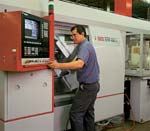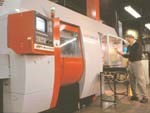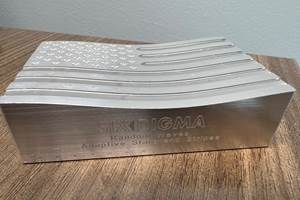Turning Centers Yield Solutions With Support
When this process engineer went searching for new turning centers for the Black&Decker plant in Fayetteville, North Carolina, he knew that he needed reliable machines, but he did not have a specific vendor in mind.
Share




When Gary Smith went searching for new turning centers for the Black & Decker plant in Fayetteville, North Carolina, he knew that he needed reliable machines, but he did not have a specific vendor in mind. Black & Decker employees at the plant make corded professional and household power tools. There is constant motion with numerous assembly lines making all sorts of products simultaneously. Circular saws, table saws, miter saws and drills are just some of the tools made by the 1,600 workers during three shifts.
Mr. Smith, a process improvement engineer, is very meticulous and used a specific methodology in his search for a new vendor. Each prospect was given blanks and asked to turn them based on parameters provided by Mr. Smith. It was this capability study that formed a large part of Mr. Smith's evaluation.
Emco Maier (Columbus, Ohio) responded with two machines—the Turn 465, which produces the blank, and the Turn 365, which finishes the bore. "They by far had the best capability study," Mr. Smith says of Emco. The specified tolerance in the bore was ±0.0002 inch with a Cpk greater than 1.33. During the 2-hour continuous runoff, results were stored and evaluated. Emco's ET 365 beat the tolerance with an impressive Cpk value of 1.77.
"Gary's big complaint was that the machines he currently had weren't heavy duty enough and weren't going to last for the long-term like they wanted," says Jeff Murray, Emco Maier's director of marketing. "That's when we started looking at the 365 and the 465, two of our larger machines. They have the accuracy and longevity to run parts for them for a long time, so that's why we selected those two machines."
The Turn 465 features dual turrets and dual spindles. This enables it to cut cycle time in half on some parts because the front half of the part and the back half of the part are machined at the same time.
The Turn 365 comes equipped with a robot called the "Gantry Loader" that automatically loads and unloads the machine and places the finished part on the gage. The gage checks the part after it has been machined. If the part is in tolerance, it will go into a good chute. If the part is out of tolerance, the gage will note that and put the part on another slide to go to a different area. If the part is in tolerance but in the ‘danger zone,' it will be put in the good bin, but an automatic adjustment would be made on the machine so that the next part would be in the range.
Emco had the machines Mr. Smith wanted. But he also wanted something else: customer service. "Even if Emco had the best machine in the world, if they weren't going to be there to support and service the machine long-term, I don't want it," Mr. Smith says.
Viewing the process from afar, sales engineer Steve Price says, "Emco's responsiveness from the outset of their dealings with Black & Decker was above ordinary. They did a very good job of detail follow-through. Gary is a very meticulous guy, and Emco matched up with him. They fit."
The result was an order for a Turn 365 and Turn 465 from Emco Maier. It was a nearly 2-year quest that resulted in the machines arriving at the Black & Decker plant in July 2000. As part of the deal, Emco Maier committed to a week of installation and a week of training for each machine. "They spent a significant amount of time down here working with our people," Mr. Smith says.
And it has proven to be a good investment. Mr. Smith says he has been pleased with the machine's performance. "There's a little bit of a learning curve," he says, "because the Siemens controller is different than we're used to, but as far as the machines, everyone is very happy with them.
"I am very pleased with what they've done. I'm somewhat demanding. We pay a lot of money for this equipment, and a lot of vendors don't do their work. We buy turn-key operations. We don't buy a machine and install it ourselves. We don't have the resources. We buy the whole package from a vendor, and Emco has done some of the best work I've seen."
Related Content
Digitalization and Done-In-One Reign Supreme at BIEMH 2024
European manufacturers may have a different balance of markets than their U.S. counterparts, but the practical challenges they must overcome are often similar — as are the solutions.
Read MoreInverting Turning and Five-Axis Milling at Famar
Automation is only the tip of the iceberg for Famar, which also provides multitasking options for its vertical lathes and horizontal five-axis machine tools.
Read MoreMachine Tool Drawbar Made With Additive Manufacturing Saves DMG MORI 90% Lead Time and 67% CO2 Emission
A new production process for the multimetal drawbar replaces an outsourced plating step with directed energy deposition, performing this DED along with roughing, finishing and grinding on a single machine.
Read MoreBuilding Machines and Apprenticeships In-House: 5-Axis Live
Universal machines were the main draw of Grob’s 5-Axis Live — though the company’s apprenticeship and support proved equally impressive.
Read MoreRead Next
Setting Up the Building Blocks for a Digital Factory
Woodward Inc. spent over a year developing an API to connect machines to its digital factory. Caron Engineering’s MiConnect has cut most of this process while also granting the shop greater access to machine information.
Read MoreRegistration Now Open for the Precision Machining Technology Show (PMTS) 2025
The precision machining industry’s premier event returns to Cleveland, OH, April 1-3.
Read More5 Rules of Thumb for Buying CNC Machine Tools
Use these tips to carefully plan your machine tool purchases and to avoid regretting your decision later.
Read More


















.jpg;maxWidth=300;quality=90)



.jpg;maxWidth=300;quality=90)













